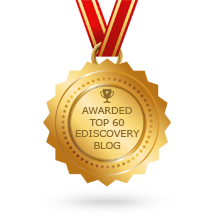In my last post, I provided an overview of New Zealand Law and Technology Conference, which was held in Auckland on the 18th of March.
So let’s now look at some of the highlights from the Legal & eDiscovery Stream.
eDiscovery 101
The conference kicked off with a breakfast workshop – eDiscovery 101 – Back to Basics. The workshop was led by myself, with expert support from Buddle Findlay Senior Associate Bridgette White and Sarah Cordner of EY.
We explored the court requirements in preparing for the first Case Management Conference and embracing the Discovery Checklist, whilst providing a practical insight into the entire eDiscovery process, including a step by step guide for undertaking any eDiscovery exercise.
The theory was complemented by practical tips to help legal professionals produce electronic information proportionately and cost effectively. To assist the practical side we split the workshop into groups and worked through an eDiscovery case study. We presented delegates with a tailored discovery order and worked through with them and posed the following practical eDiscovery considerations –
- How do you collect/receive those documents?
- What methods will you use to cull and isolate the documents that you need?
- How will you carry out the review of those documents?
The workshop was an ideal starting point prior to exploring the wider issues associated with law and technology throughout the conference.
Keeping discovery simple
After the judicial keynote, Guy Burgess from Clendons presented a session on the Challenges of eDiscovery in small matters. He discussed lessons learnt from recent cases, and practical steps to improve the efficiency of the discovery process. Guy covered the practical issues involving matters with little or no electronic evidence, and how to meet the court’s discovery requirements in these circumstances.
The session delivered by Guy, was an excellent example of the issues being experienced by many New Zealand lawyers, whilst also exploring some of the solutions to tackle these issues. Many of the principles mentioned by Guy could be applied to any eDiscovery exercise, regardless of size or complexity. As Guy mentioned “small discoveries often require a more tightly-focused, pragmatic approach”.
Guy stressed that it is important to focus attention to discovery at an early stage. A simple discovery can quickly become more complicated than expected.
A Partners perspective of eDiscovery in large litigation
Chris Curran a litigation partner from Russell McVeagh, drew on his many years of commercial litigation and experience with eDiscovery in the courts to discuss the Challenges of eDiscovery in a large litigation cases. Chris provided practical advice and shared his experiences with managing the issues that arisen.
In his session Chris emphasised that discovery is not just about the documents. It is also important to invest the time at the outset of a matter developing a thorough discovery strategy. This strategy will also include talking to the client about their information.
Chris underlined that any approach needs to be “iterative, fluid and staged”. We have all worked on matters where the pleadings change or new facts may come to light. It is important to be able to respond to these issues.
Some things change – some things stay the same
Daniel Toresen from Thompson & Toresen then investigated the changing face of evidence. He used his 25 years of industry experience to discuss how the growth of technology has led to many new forms of evidence, and how this evidence should be considered by lawyers.
The session identified new forms of evidence that we now see, whilst how we interact and communicate with each other has changed. With this Daniel then explored some of the challenges that can arise with the new forms of evidence in how we go about identifying and collecting it.
Daniel provided many real life experiences with his clients that kept the audience interested.
eDiscovery War Stories
The legal & eDiscovery stream concluded with a panel discussion featuring industry professionals who discussed When eDiscovery goes bad. The panel was made up with Scott Gillard of FTI Consulting, Jo Sherman of EDT, Sarah Cordner of EY and myself. We covered the many common challenges of eDiscovery, sharing our experience of disasters, train wrecks and calamities to try and better arm delegates to improve efficiency reduce costs and simplify their own discovery process.
The ‘war stories’ recalled past experiences that showed some of the frustrations with eDiscovery, and some did seem unbelievable that they were allowed to happen. At the same time we looked to provide thoughts on more effective ways to tackle eDiscovery. What came across was the importance of early preparation and planning for discovery, which echoed the thoughts from the workshop earlier in the day as well as fellow speakers.
The panel provided a good cross section of best practice, coupled with years of cynicism and what actually works in the real world when it comes to eDiscovery.
Read more about the New Zealand Law and Technology Conference here –
Overview of New Zealand Law and Technology Conference
Highlights of the Legal Technology Stream
Highlights of the Legal Demonstrations & Case Studies Stream

